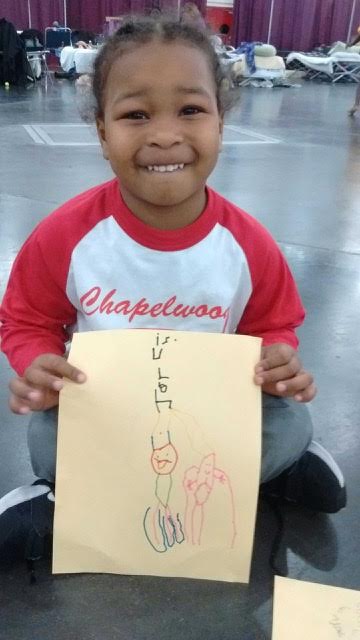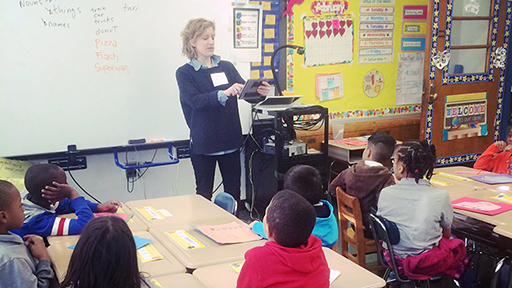When Hurricane Harvey struck Houston, Texas at the end of the summer, Writers in the Schools (WITS) in Houston immediately mobilized for a volunteer effort at the main shelter for those displaced by the storm. In the four linked pieces here, WITS Executive Director Robin Reagler and WITS staff writers Cait Weiss Orcutt, Nancy Barnhart, and Joshua Nguyen describe the magnitude of the disaster, the role WITS played in the immediate aftermath of the storm, and the organization’s ongoing commitment to helping the community heal.
“The ocean is wearing my clothes,” one child reported after living through the epic storms that inundated the Houston metropolitan area this past summer in the wake of Hurricane Harvey. With 51 inches of water over a period of days, it was the floods, not the winds, that did the most damage. Harvey delivered 27 trillion gallons of rain to the Texas Gulf Coast, making it the wettest Atlantic hurricane ever measured. The d Regardless, a storm can have a lot of impact on residents in the area.
When the deluge finally ended, Writers in the Schools (WITS) in Houston asked our writers if they wanted to volunteer to work with flood-affected families. We were at the shelters for a total of nine days, and there were three shifts each day, each three hours long. Within an hour all thirty slots on the schedule were filled.
Humans are storytellers to the core. We connect with one another
through language, through poetry. That’s what makes the work WITS
does a powerful part of the healing process.
Workers were helping to provide residents with the basic necessities-food, shelter, health care, and clothing whilst supporting families who were making plans for when they return home-WITS volunteers spent time being with children, sharing books and stories, and recording kids’ words.
Humans are storytellers to the core. We connect with one another through language, through poetry. That’s what makes the work WITS does a powerful part of the healing process.
As writers in schools, our job, perhaps more than anything else, is to listen. We are incredibly invested, deep listeners. And so when a child says, “The ocean is wearing my clothes,” we hear the poetry, we interpret the symbolism, and we feel the sense of loss. Healing begins when experience becomes story.
For Houston, Harvey is not over yet. On Thanksgiving Day, 42,000 families were still living in hotel rooms. As we all know, it takes a very long time to heal from trauma. The WITS project at GRB was only the beginning of what will be a long-term commitment to working with young people whose lives were changed by Harvey and its aftermath. We are using the WITS Emergency Fund, created in response to Harvey with $10,000 in donations matched by $20,000 from a foundation, to provide long-term WITS workshops in schools that were destroyed or displaced by the storm. Our hope is that students will use their words both to make sense of what has happened and also to become articulate, powerful, and authentic citizens who nurture their community through their vision and activism.
Read the following pieces by WITS writers who volunteered at the shelter:
“When Can I Go Home? Sharing Stories in the Aftermath of Harvey” by Cait Weiss Orcutt
“Writing with Serenity” by Nancy Barnhart
“Creating a Refuge with Stories” by Joshua Nguyen
Robin Reagler serves as the executive director of Writers in the Schools (WITS) in Houston and also leads the national WITS Alliance, a cooperative of 36 literary education programs. She is the author of two poetry chapbooks. Teeth & Teeth, selected by Natalie Diaz, won the Charlotte Mew Prize and will be published by Headmistress Press in 2018. Dear Red Airplane, published by Seven Kitchens Press (2011) won the ReBound Series and will be re-issued with a foreword by Laura Mullen. Her poems have appeared in Ploughshares, Pleiades, Iowa Review, and Colorado Review. She volunteers on the LitNet and AWP Board of Directors.


